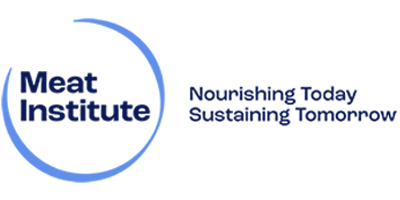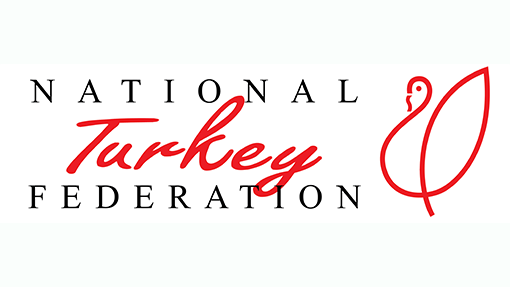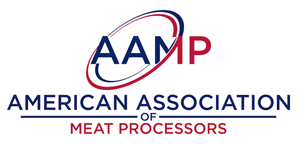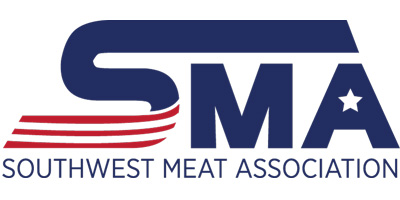Food Safety: Produces Safe Products without Exception
Food safety is a top priority for the U.S. meat and poultry industry. The Federal Meat Inspection Act of 1906 and the Poultry Products Inspection Act of 1957, along with the many regulations and policies put in place to implement those Acts, ensure that the meat and poultry industry is among the most regulated industries in the nation. U.S. Department of Agriculture inspectors from the Food Safety and Inspection Service (FSIS) are continuously present in meat packing plants and oversee compliance with a wide array of regulatory requirements. For more information on the federal oversight of the meat and poultry industry, see the inspection information provided on FSIS’s website.
Meat Institute members have robust food safety programs that incorporate key elements such as employee training, pathogen or indicator organism tracking and analysis, foreign material control and prevention, sanitation and allergen control.
The following resources have been made publicly available to assist the entire industry in our shared goal of providing safe products, without exception.
Food Safety Equipment Design Principles
Since their inception, the Sanitary Equipment Design Principles have helped drive significant improvements in equipment design and sanitation practices. However, the use of and need for the principles has grown past its original intent. Leveraging the prominence of the Sanitary Equipment Design Principles, the 2021 Food Safety Equipment Design Task Force (FSEDTF) was charged with expanding on the existing principles and checklist to encompass all aspects of food safety, with a particular focus on foreign material.
Equipment design is critical in reducing the risk of contamination of food products by pathogens and foreign material. Optimizing the design and performance criteria for equipment and related systems by establishing industry-wide recommendations included in the Food Safety Equipment Design Principles benefits the entire industry by promoting principles intended to reduce contamination and associated recalls. These principles were developed for all equipment used in meat and poultry establishments to address various food safety hazards, but they may be applicable for other similar wet cleaning food operations.
The official principles booklet, includes an introduction and a glossary with additional information on certain principle elements.
 Download Food Safety Equipment Design Principles Booklet (PDF)
Download Food Safety Equipment Design Principles Booklet (PDF) (Spanish version)
Traducido por Commercial Food Sanitation
Translated by Commercial Food Sanitation
The downloadable spreadsheet version of the checklist automatically calculates the overall score.
Note: The link above is designed to download a file and will not direct you to another webpage. If your computer does not prompt you to open the newly downloaded file, check your “Downloads” folder.
The Meat and Poultry Industry Foreign Material Manual
Considerations for Designing a Foreign Material Control & Prevention Program
The Foreign Material Manual is a comprehensive compilation of information for establishments to consider when designing a Foreign Material Control & Prevention Program (FMCPP), covering the entire process in three main sections: prevention, detection, and response. The manual is the result of member participation in an industry wide partnership of associations to reduce the occurrence of foreign material in meat and poultry products.
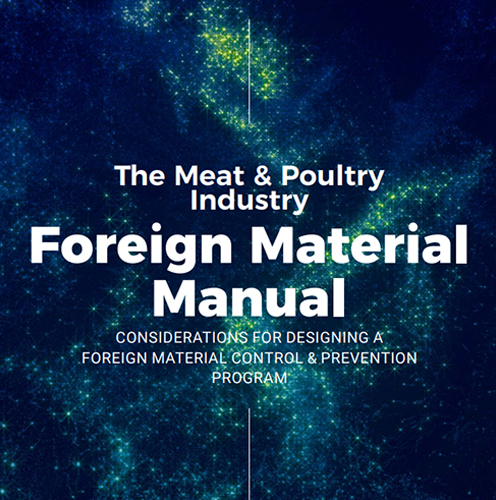
The official principles booklet, includes an introduction and a glossary with additional information on certain principle elements.
Foreign material control and prevention is crucial to the success of any operation and a FMCPP should be specific to each establishment. Companies and establishments can use the manual as a reference when developing a FMCPP, but it is important to note that not all of the information will apply for every operation. Although the manual was designed for meat and poultry establishments, some aspects may be applicable to other food processing sectors.
External Resources
HACCP: Hazard Analysis and Critical Control Point
The implementation of the Hazard Analysis and Critical Control Point (HACCP) final rule for pathogen reduction and FSIS' laboratory testing programs are two areas that help ensure the safety of the meat, poultry, and egg products supply.
SSOP: Sanitation Standard Operating Procedures
Sanitation Standard Operating Procedures are written procedures that an establishment develops and implements to prevent direct contamination or adulteration of product.
Process lethality spreadsheet
The purpose of the process lethality determination model is to provide processors with a science-based validation tool that can be used to demonstrate the effectiveness of a specific heat process to destroy a microorganism of concern.
Foreign Material Complaint Best Practices
The purpose of this best practices document is to provide a method of receiving, investigating, and responding to foreign material complaints


